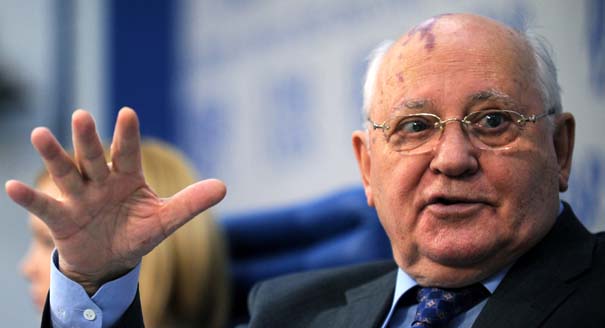The all powerful Communist Party ran the Soviet Union, and the Soviet Union commanded half the world. But 25 years ago, taking the helm of this grandiose edifice, Mikhail Gorbachev already knew that this might was in many respects an illusion. The communist Soviet Union was inexorably losing ground in the competition with the capitalist world, and within the country itself people had long before lost faith in the dogmas of Marxism-Leninism. Neither did they believe the government itself. Various estimates put the number of people listening to western radio stations at between 8 million to 30 million. The truth came from abroad in their eyes, while at home they were surrounded by lies, hypocrisy and the enduring trappings of Brezhnev-era stagnation. Soviet society agonized in a chronic shortage of everything, and not just goods. People felt the shortage of truth and freedom just as keenly.
Gorbachev and his liberal allies were powerless to make the economy more effective, but the ability to give people truth and freedom was directly in their hands. The party leadership made its choice and their proclaimed policies of glasnost and perestroika opened the way to a hitherto unprecedented degree of individual freedom and, short of offering definitive truth, at least provided a broad range of sources of information. People had an insatiable appetite for truth and freedom and responded to perestroika with immense enthusiasm. It is enough to recall the enormous circulation numbers of perestroika-era publications, the impassioned speakers at the first Congresses of People’s Deputies, and the huge crowds at democratic meetings. The emergence of cooperatives loosened another of the drastic restrictions that had kept Soviet society bound up for so long, giving people the chance to satisfy one of the most basic social needs – show entrepreneurial spirit and make a profit. These truly revolutionary changes may have been given from above, but people welcomed them wholeheartedly as the fulfillment of a long-cherished dream. The perestroika years were therefore one of the rare moments in Russian history when society came together in a wave of positive spirit, even if today’s Russians remember it in a different light now.
The achievements of those years have not vanished. The individual freedoms received then (unlike the civil and political liberties) remain intact. People are free to earn and spend their money as they wish, and this right, consolidated during the Yeltsin years, remains in place today. Of course, entrepreneurs do encounter serious difficulties, but those who have a bent for business are nonetheless free to invest their money and effort, turn a profit and ensure a decent life for themselves and their families.
But democracy, which Gorbachev and his allies spoke of just as much as of freedom, has not been so lucky. The people back in the Soviet Union discussing multiparty systems, political institutions, the rule of law and division of powers had only abstract notions of these things. Even fewer people realized that creating and consolidating a democratic system requires tremendous effort not just from the people at the top, but from the nation as a whole. But the desire to make an effort for the sake of something bigger than one’s own private world flared in a short-lived burst of enthusiasm during the perestroika years and faded soon after. The passive and fragmented society that replaced it played right into the hands of the people running the country for the last decade, who preferred a return to the more familiar and reliable paternalist state rather than the uncertainties of democracy.
